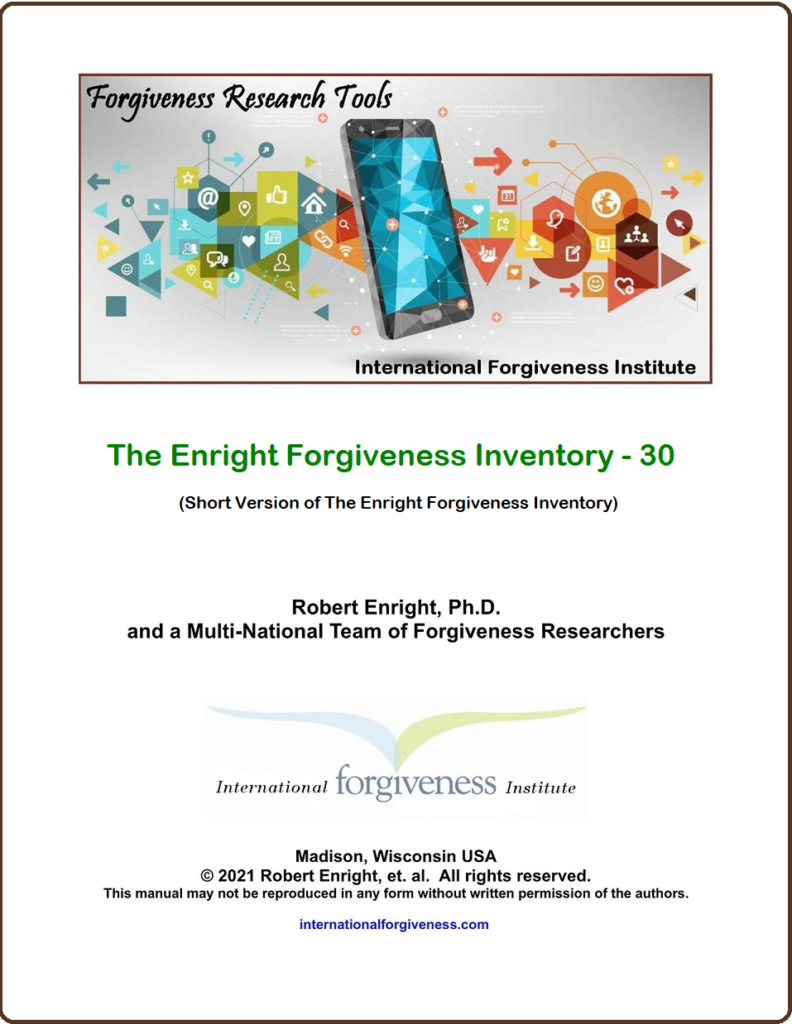Author Archive: directorifi
ENRIGHT FORGIVENESS INVENTORY, A STANDARD MEASUREMENT TOOL USED AROUND THE WORLD, NOW AVAILABLE IN SHORTER VERSION
An eight-nation study designed to test the applicability and sensitivity of the new short form of the Enright Forgiveness Inventory, the EFI-30, has demonstrated that the new instrument is a reliable and valid research tool that can be used across widely diverse cultures.
The Enright Forgiveness Inventory-30 (EFI-30) is a shorter version of the Enright Forgiveness Inventory for Adults (EFI) that was the first forgiveness measurement tool developed by Dr. Robert Enright and his Human Development Study Group at the University of Wisconsin-Madison. The EFI is an objective measure of the degree to which one person forgives another who has hurt him or her deeply and unfairly. 
After its development in 1995, the EFI quickly became a central component of forgiveness research both in the U.S. and internationally. It has been translated from English (original language) into Brazilian-Portuguese, Chinese, German, Hebrew, Korean, Dutch, and other languages. Its reliability and validity have been exhibited in Master’s theses, doctoral dissertations, and empirical articles published around the world.
The new study, Validating the Enright Forgiveness Inventory-30, was published this month in the European Journal of Psychological Assessment. It outlines the process and rationale used by the study’s authors to create a shorter version of the EFI (30 items instead of the original 60) that could convey the same meaningful information on the degree of interpersonal forgiveness across the domains of affect, behavior, and cognition. In other words, they developed a smaller, less time-consuming scale that is still accurate and reliable.
Data from the U.S. were used in the creation of the new measure and applied to seven other countries: Austria, Brazil, Israel, South Korea, Norway, Pakistan, and Taiwan. Results from the study provided the psychometric evidence for the reduced version of the EFI-30 across cultures. (NOTE: psychometrics is the branch of psychology that deals with the design, administration, and interpretation of quantitative tests for the measurement of psychological variables such as intelligence, aptitude, and personality traits.)
“While the EFI is particularly relevant when it accurately assesses people with low degrees of forgiveness,” Dr. Enright said in comparing the two research tools, “the EFI-30 has still demonstrated its effectiveness to distinguish particular cultural social norms that apply to the behavioral expression of forgiveness.”
According to Dr. Enright, the new EFI-30 tool is suitable to verify affective, behavioral, and cognitive changes in people who choose forgiveness for improvement of their well-being. He adds that it is designed to assess six psychological stances of victims toward offenders: positive affect, negative affect, positive behavior, negative behavior, positive cognition, and negative cognition.
The EFI-30 and other highly-regarded forgiveness research tools developed by Dr. Enright, co-founder of the International Forgiveness Institute (IFI), are now available absolutely free to any forgiveness researcher who requests them. To learn more about the tools, see the IFI website article Coveted Forgiveness Research Tools Now Available at No Cost. To request Research Tools for your own use, see Dr. Enright’s Forgiveness Research Tools.
New Study Shows Forgiveness Intervention can Improve Mental Health of Grieving Parents
In the first ever true experimental study of its kind, researchers have demonstrated the effectiveness of an educational forgiveness intervention on improving the mental health of parents grieving the loss of a child. The research was conceptualized and done by Lucia Záhorcová, a psychologist at Trnava University in Slovakia. The forgiveness intervention was developed by Dr. Robert Enright, co-founder of the International Forgiveness Institute, who also directed the study in the country that was once part of Czechoslovakia.
The pilot study results showed that participants in the experimental group (who received the forgiveness intervention), compared to those in the control group, achieved:
- Statistically greater improvement in forgiveness towards others and in self-forgiveness in both the post-test and the follow-up test conducted four months after the end of the intervention;
- A greater decrease in depression in both the post-test and follow-up test;
- A greater decrease in anxiety and anger in the post-test; and,
- Higher improvement in the post-traumatic growth in the follow-up test.
“The death of a child is a one of the most devastating and traumatic experiences a parent can endure,” according to Dr. Enright. “That’s why we wanted to determine if forgiveness could be a positive influence in reducing a parent’s depression, anxiety and anger just as it has been demonstrated in our studies with other clinical populations like incest survivors, emotionally-abused women, and post-abortion men.”
Dr. Enright said the study in Slovakia was the first ever forgiveness intervention with grieving parents in which a control group was used. It included 21 parents randomly assigned to the experimental group (in which the educational forgiveness intervention occurred) and 21 to the control group (in which a psycho-education grief intervention with a humanistic approach took place). All the parents were grieving the loss of a child older than three years of age.
“The study demonstrated that the forgiveness intervention definitely resulted in mental health improvements for parents grieving the loss of a child,” Dr. Enright stated. “The ability to forgive another person, perhaps even the murderer of their child, can positively influence the mental health of a bereaved parent.”
The Effectiveness of a Forgiveness Intervention on Mental Health in Bereaved Parents – a Pilot Study, was published on June 21, 2021, in OMEGA – Journal of Death and Dying. In addition to Dr. Enright (Dept. of Educational Psychology, University of Wisconsin-Madison) the study researchers included Lucia Záhorcová and Peter Halama, both in the Dept. of Psychology at Trnava University in Trnava, Slovakia. The three also teamed up for a 2019 study of 84 grieving parents called Forgiveness as a Factor of Adjustment in Bereaved Parents.
The Psychology of Interpersonal Forgiveness
By Suzanne Freedman, Ph.D.
Professor, University of Northern Iowa
I loved seeing the article on forgiveness in last month’s newsletter. I have discovered in my 30 years of studying forgiveness from a psychological perspective, that there are many misconceptions associated with what it means to forgive and contexts associated with forgiveness.
A common comment I hear from students in my university course on interpersonal forgiveness is that forgiveness is more complicated than people realize. It may not be the same notion of forgiveness preached by one’s parents or a religious leader. It goes beyond just saying the words, “I’m sorry” or “I forgive you.” Although we often ask for forgiveness for minor injuries, forgiveness occurs in the context of deep, personal and unfair hurt (Smedes, 1996, The Art of Forgiving).
Specifically, forgiveness involves a willingness to abandon one’s right to resentment, negative judgment, and negative behavior toward an offender, while fostering the undeserved qualities of compassion, empathy, and goodwill toward one’s offender (Enright, 2001, Forgiveness is a Choice). Notice that in this definition, one has a right to resentment and that the offender does not deserve one’s compassion and goodwill.
Although frequently confused with forgetting, acceptance, condoning, excusing, pardon, and denial of anger, forgiveness is none of these. When we forgive, we decrease our negative thoughts, feelings, and behaviors toward the offender and over time, increase our positive thoughts, feelings, and sometimes behaviors toward the offender. We can also only forgive for the way that we were personally impacted by an offense.
Another common misconception about forgiveness is that you cannot forgive unless you receive an apology from the offender. This may be true for reconciliation but not forgiveness. Forgiveness is something people can do all on their own, for their own well-being, without any response from the offender. Forgiveness can sometimes lead to reconciliation between the injured party and the offender, but it does not have to.
I began my career by educating adult incest survivors about forgiveness, and have recently turned my attention to children and adolescents. By teaching students about the psychological process of forgiveness, we are helping them develop healthy ways to express feelings, understand the perspective of others, and practice empathy and kindness.
As summarized by a 5th grader who was part of a forgiveness education program that I taught:
“I’ve learned that anger is a natural feeling. It takes time to forgive. You don’t have to forgive right away. They don’t always apologize. Forgiveness is one step closer to healing. You don’t have to be friends with the offender after. Apologies make forgiving easier. Forgiveness is made by the person who was hurt. If you want revenge, then you haven’t forgiven in your heart.”
I am often asked “Why forgive?” and my response is always the same: “What’s the alternative?” Although forgiveness cannot undo the injury, or damage caused by the injury, it allows us to move forward in our lives free from the negative effects of all-consuming anger, hatred, and resentment. It offers us a way to heal while still acknowledging that what happened to us was wrong, unfair, and extremely hurtful.
This article originally appeared in the June 2021 issue of SEL in Action, “a newsletter written for educators, by educators to share real world stories, questions, ideas and opinions about how to address the social and emotional needs of students and the adults who teach them.” Social-emotional learning (SEL) is the process of developing the self-awareness, self-control, and interpersonal skills that are vital for school, work, and life success.

Dr. Suzanne Freedman
Dr. Suzanne Freedman is the author of The Courage to Forgive: Educating Elementary School Children About Forgiveness, a curriculum guide for 4th and 5th grade students she co-authored with Dr. Robert Enright.
Dr. Freedman was recognized with a Veridian Community Engagement Fellowship (Fall 2020) for “meeting a community need through teaching and/or scholarship.” That same year she was also awarded a Kern Family Foundation Grant for a project that “examined ways that moral virtues, such as empathy, can be infused into a course on child and adolescent development.“
Learn more about Dr. Freedman and her work at the University of Northern Iowa.
What if I think that forgiveness is not the solution? Then what?
Forgiveness is not necessarily a solution to injustice because to right that wrong you need the moral virtue of justice. Forgiveness is a response to injustice in that you are now confronting the effects of the injustice (anger, possibly a strained relationship, disharmony in the family or organization) and so it is important to address those negative effects, if you choose to forgive. So, if you are thinking about forgiveness as solving the problem of injustice, I think you are asking the wrong question about forgiveness. Instead of “How will forgiveness solve this problem?” I would urge you to ask a different question: “How can forgiveness help me (and us) overcome the negative effects of the injustice?”
Is it possible that for some people forgiveness does not “work” in that they find no relief?
When this happens, I recommend: 1) more time in forgiving this person and, if this still is not working, 2) try to see if this person reminds you of someone else in need of your forgiving. For example, a person is having trouble forgiving his wife. His wife has behavioral patterns similar to his mother, whom he has not forgiven. I then recommend that he forgive his mother first. When he then focuses on forgiving his wife, the anger toward his mother is not getting in the way of that forgiving.



